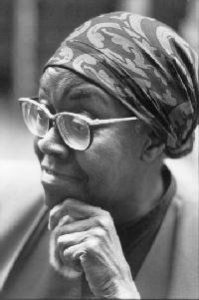 Gwendolyn Brooks (June 7, 1917 – December 3, 2000) was an award-winning African American woman poet. Born in Topeka, Kansas, she grew up in and remained in Chicago, Illinois. Although she also wrote a novel, an autobiography and some other prose works, she was noted primarily as a poet. Her 1949 book of poetry, Annie Allen, received a Pulitzer Prize, the first won by an African American. In 1968, she was made Poet Laureate of Illinois. Other awards she received included the Frost Medal, the Shelley Memorial Award, and an American Academy of Arts and Letters award.
Gwendolyn Brooks (June 7, 1917 – December 3, 2000) was an award-winning African American woman poet. Born in Topeka, Kansas, she grew up in and remained in Chicago, Illinois. Although she also wrote a novel, an autobiography and some other prose works, she was noted primarily as a poet. Her 1949 book of poetry, Annie Allen, received a Pulitzer Prize, the first won by an African American. In 1968, she was made Poet Laureate of Illinois. Other awards she received included the Frost Medal, the Shelley Memorial Award, and an American Academy of Arts and Letters award.
Her poetry is rooted in the poor and mostly African-American South Side of Chicago. She initially published her poetry as a columnist for the Chicago Defender, an African American newspaper. Although her poems range in style from traditional ballads and sonnets to using blues rhythms in free verse, her characters are often drawn from the poor inner city. Her bluesy poem We Real Cool is often found in school textbooks. She is seen as a leader of the Black Arts movement.
After her first book of poetry was published in 1945, she received a Guggenheim Fellowship. After John F. Kennedy invited her to a Library of Congress poetry festival in 1962, she began a college teaching career which saw her teach at Columbia College Chicago, Northeastern Illinois University, Elmhurst College, Columbia University, Clay College of New York, and the University of Wisconsin. She was the 1985 Library of Congress’ Consultant in Poetry, a one year position whose title changed the next year to Poet Laureate Consultant in Poetry. In 1994, she was chosen as the National Endowment for the Humanities’s Jefferson Lecturer, one of the highest honors for American literature.

